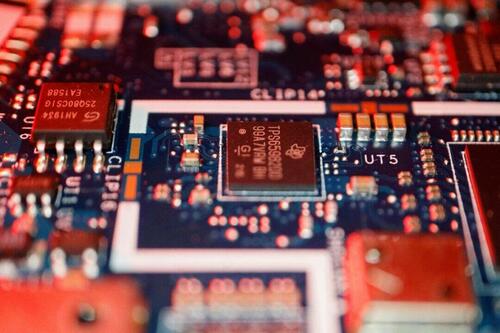Chinese Nationals Charged For Allegedly Exporting Microchips To China Without License

Authored by Bill Pan via The Epoch Times (emphasis ours),
Two Chinese nationals have been arrested in southern California for allegedly exporting tens of millions of dollars worth of “sensitive microchips” to China in violation of export controls, federal prosecutors said.

The U.S. Justice Department on Aug. 5 announced charges against Geng Chuan, 28, of Pasadena, California, and Yang Shiwei, 28, of El Monte, California, under the Export Control Reform Act, a felony offense punishable by up to 20 years in prison. Geng voluntarily surrendered to authorities on Aug. 2, while Yang was arrested earlier on the same day.
The lawyers of Geng and Yang could not be reached for comment.
According to the Justice Department, between October 2022 and July 2025, Geng and Yang used their El Monte-based company, ALX Solutions, to export advanced graphics processing units (GPUs) to Singapore and Malaysia. Both countries are commonly used as transshipment points to conceal China as the ultimate destination.
ALX Solutions did not receive payment for the chips from the purported recipients in Southeast Asia, prosecutors said. Instead, it was paid by companies in Hong Kong and China. Payments included a $1 million transaction from a China-based company in January 2024.
The Justice Department did not specify the brand or model of chips involved but described them as “the most powerful GPU chips on the market,” explicitly designed for use in self-driving cars, medical diagnosis systems, and other applications powered by artificial intelligence. Such chips require a special export license from the U.S. Commerce Department before they can be legally shipped to China, a permission that ALX Solutions never applied for or obtained, according to prosecutors.
Authorities said they found evidence suggesting that Geng and Yang allegedly attempted to evade export controls.
“Last week, law enforcement searched ALX Solutions’ office and seized the phones belonging to Geng and Yang that revealed incriminating communications between the defendants, including communications about shipping export-controlled chips to China through Malaysia to evade U.S. export laws,” the Justice Department said in a statement.
Geng, a U.S. lawful permanent resident, has been released on a $250,000 bond. Yang, who allegedly overstayed her visa, remains in custody, with a detention hearing scheduled for Aug. 12.
Both defendants are scheduled to be arraigned on Sept. 11.
In October 2022, the Biden administration imposed a set of export restrictions on advanced semiconductors and manufacturing equipment in an effort to slow the Chinese military’s artificial intelligence development and maintain U.S. leadership in this critical sector. In response, the Chinese Communist Party launched a massive campaign to both accelerate domestic chip innovation and circumvent export controls.
In 2023, Chinese telecom giant Huawei unveiled its Mate 60 Pro smartphone, powered by a homegrown seven-nanometer chip—a milestone hailed by Beijing as a symbol of defiance. The phone’s release prompted the Biden administration to reflect on whether its sanctions were compromised.
The Trump administration, while still maintaining strict controls on the most advanced semiconductor exports to China, has supported a strategy of allowing sales of lower-end U.S. chips, hoping to foster an ecosystem in which Chinese companies continue to rely on U.S. hardware and do not seek domestically produced alternatives.
Loading recommendations…









